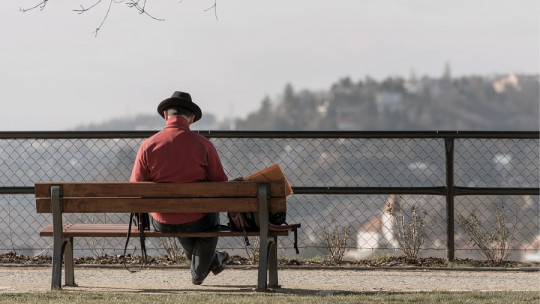
Old age is an indisputable reality of human life. All people, at some point, will reach (or have the expectation of reaching) old age. Aging is inevitable, and it is followed by different physical, psychological and social problems. Old age has an impact on all aspects of life, and is therefore a difficult process to navigate and in which many complications can appear.
One of these common difficulties of old age is loneliness. Aging can produce feelings of loneliness and social isolation for different reasons. From the death of close people to difficulties with physical mobility and social activities as they were understood before aging; There are many reasons that can make people feel lonelier once they reach a certain age.
In this article, We will talk about old age, understanding the relationship that, in many cases, this life stage has with loneliness and feelings of social isolation. We will propose some factors that contribute to this loneliness and offer different techniques and strategies to find solutions to these problems.
Factors that contribute to loneliness in old age
To begin, we will propose some of the most common factors that can contribute to loneliness in old age. It is important to emphasize that these factors do not have to have this impact in all cases; Each person is different and lives specific life situations. Therefore, what may result in one thing for some may have a completely different impact for others.
1. Social and family changes
Changes in family and social dynamics are significant factors contributing to loneliness in old age. As time passes, it is common for seniors to experience the loss of friends, spouses, and close family members. Additionally, retirement and decreased participation in social activities can reduce contact with others, leading to a feeling of isolation. Family structures are also evolving, with smaller, geographically dispersed families, which can limit the social interactions of the elderly. These changes can leave seniors feeling alone and disconnected from their traditional support networks.
2. Loss of loved ones
The loss of loved ones is another fundamental cause of loneliness in old age. As we age, it is inevitable to face the reality of losing close friends, spouses, and family members. These losses not only represent the physical absence of significant others, but also involve the loss of vital emotional and social connections.
The death of lifelong companions can leave seniors feeling alone and helpless, facing an emotional void that can be difficult to fill. The loneliness resulting from these losses can be especially acute, as the elderly may find themselves struggling to adjust to life without the constant presence of those who once provided them with companionship and unconditional support.
3. Physical limitations and reduced mobility
With advancing age, it is common for individuals to experience a decrease in their physical capacity and greater difficulty performing daily activities. This decrease can limit participation in social activities, community events, and gatherings with friends and family. Besides, Lack of accessibility in public and private settings can make social interaction even more difficult for the elderly.
These physical limitations can leave seniors feeling isolated and excluded as they face barriers to fully participating in social life and maintaining meaningful connections with others.
4. Technological barriers
Technological barriers represent another important obstacle in the fight against loneliness in old age. With so many digital advances, many social interactions and everyday activities take place online. However, many seniors may face difficulties adapting to technology due to unfamiliarity or limited access to digital devices and resources.
The digital divide leaves seniors disconnected from modern forms of communication and social participation, which can increase their sense of isolation and loneliness. It is crucial to address these technological barriers through digital literacy programs and the creation of accessible environments that facilitate the participation of older people in the digital world.
5. Economic factors
For many seniors, the financial situation can limit their ability to participate in social activities and maintain meaningful connections with others. The costs associated with transportation, participation in social or recreational events, and even technology can be prohibitive for those with limited financial resources. Additionally, a lack of financial resources can make it difficult to access care and support services, which can increase feelings of isolation among the elderly.
Consequences of loneliness in old age
These problems and situations of loneliness and isolation among older people can have negative consequences on the health, both mental and physical, and the social life of the affected people. Below, we will discuss some of these negative consequences of loneliness in old age.
1. Impact on mental and physical health
Seniors who experience chronic loneliness may feel trapped in a negative cycle of thoughts and emotions, which can negatively impact their quality of life and overall well-being. Besides, Loneliness can have detrimental effects on the physical health of the elderly. Numerous studies have shown that loneliness is associated with an increased risk of developing a variety of health problems. Chronic stress caused by loneliness can weaken the immune system and increase vulnerability to chronic illness and disease.
2. Social isolation
Social isolation, a common consequence of loneliness in old age, has a significant impact on the health and well-being of older people. Lack of social interaction can lead to a sedentary lifestyle and decreased participation in physical activities, contributing to physical and functional decline. In addition, it hinders access to medical care and emotional support, affecting the elderly’s ability to cope with health problems and stressful situations.
3. Depression and anxiety
Loneliness in old age is closely linked to an increased risk of depression and anxiety. The lack of meaningful social connections can lead to feelings of hopelessness, sadness, and emotional emptiness, contributing to the development of depression. Besides, Anxiety can arise from worries about the future, social isolation, and lack of emotional support. These conditions can have a devastating impact on the quality of life of the elderly, affecting their mental and emotional health.
Strategies to address loneliness in old age
As we have seen, there are a diverse number of problems associated with loneliness in old age. However, that does not mean that they cannot be faced or that there are strategies to mitigate the effect of this loneliness or help to seek social connections and thus avoid these situations of loneliness and isolation.
1. Foster social connection
Promoting social connection is essential to combat loneliness in old age. Community programs can be established that encourage the active participation of seniors in social and recreational activities. These programs may include book clubs, walking groups, art or music classes, among others. Besides, It is important to create safe and welcoming spaces where seniors can meet and socialize thus strengthening their ties to the community and reducing their sense of isolation.
2. Emotional support
Emotional support plays a crucial role in the well-being of the elderly. Family, friends, and caregivers can offer a sympathetic shoulder and encouragement during difficult times. Establishing trusting relationships and maintaining open communication can provide comfort and emotional strength to seniors facing loneliness. Additionally, support groups specific to seniors provide a safe space to share experiences and receive mutual support, thus strengthening social and emotional bonds in old age.
3. Access to resources
Ensuring access to essential resources is essential to addressing loneliness in old age. This includes providing access to affordable transportation services that facilitate participation in social and medical activities. Besides, it is important to offer information and guidance on community support programs, such as senior recreation centers, volunteer groups, and home care services. By improving access to these resources, the social fabric is strengthened and the well-being of the elderly is promoted.
4. Technology and connectivity
Technology plays an increasingly important role in the fight against loneliness in old age. Providing technology training and access to digital devices can help seniors stay connected with friends, family, and the broader community. Online platforms, such as social media and video calling apps, offer opportunities to interact and share experiences, thereby reducing feelings of isolation and fostering meaningful connections in the lives of seniors.
Conclusions
Recognizing and addressing loneliness in old age is crucial for the well-being of older people. Factors such as social changes, personal losses, and technological barriers contribute to this problem. By promoting social connection, emotional support, access to resources, and technology, we can mitigate loneliness and strengthen support networks for seniors, thereby promoting healthier, more active aging.








